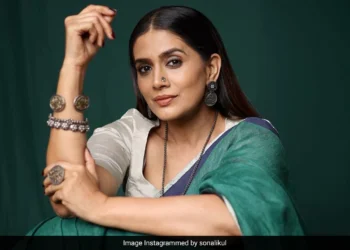Who is Arundhati Roy?
Arundhati Roy is a globally acclaimed Indian author, activist, and political commentator. She gained international recognition with her debut novel, “The God of Small Things” (1997), which won the Man Booker Prize. Beyond her literary achievements, Roy is known for her outspoken views on social justice, environmental issues, and human rights, making her one of India’s most influential public intellectuals. Her writings often critique government policies, corporate exploitation, and socio-political inequalities.
| Attribute | Details |
| Full Name | Suzanna Arundhati Roy |
| Nickname | Arundhati |
| Date of Birth | 24 November 1961 |
| Age (2025) | 63 Years |
| Birthplace | Shillong, Meghalaya, India |
| Hometown | Shillong / Delhi, India |
| Current Residence | Kerala, India |
| Nationality | Indian |
| Zodiac Sign | Sagittarius |
| Religion | Christian |
| Parents | Mary Roy (Mother), Indra Roy (Father) |
| Marital Status | Formerly Married |
| Education | Bachelor’s in Architecture, School of Planning and Architecture, Delhi |
| Occupation | Author, Activist, Political Commentator |
| Famous For | The God of Small Things, Activism, Social & Political Commentary |
| Notable Works | The God of Small Things, The Ministry of Utmost Happiness |
| Awards | Man Booker Prize (1997) |
| Height | 165 cm (5′5″ approx.) |
| Weight | 58 kg (Approx.) |
| Eye Color | Brown |
| Hair Color | Black |
| Complexion | Fair to Wheatish |
| Style Statement | Minimalistic, often traditional Indian attire |
| Hobbies / Interests | Writing, Reading, Social Activism, Traveling |
| Languages Known | English, Malayalam, Hindi |
| Social Media Presence | Twitter (@arundhatiroy), Facebook (Official), Instagram (Not Active) |
| Net Worth (Approx.) | $2–3 Million USD |
| Activism Areas | Human Rights, Environmental Issues, Tribal & Marginalized Communities, Anti-Globalization |
Arundhati Roy Early Life
Arundhati Roy was born as Suzanna Arundhati Roy on 24 November 1961 in Shillong, Meghalaya, India. She was raised in a culturally diverse environment, with a Christian mother, Mary Roy, who was a progressive educator and women’s rights activist, and a father, Indra Roy, who was a Bengali Hindu man.
Her mother played a significant role in shaping Arundhati’s worldview, instilling values of independence, critical thinking, and advocacy for social equality. She spent her early years moving between different parts of India, which gave her a broad perspective on the country’s social and cultural diversity.
Arundhati Roy Education
Arundhati Roy pursued a diverse educational path:
- Schooling: She attended various schools in India, including Carmel Convent School in New Delhi.
- Higher Education: She studied Architecture at the School of Planning and Architecture, Delhi, and graduated in the mid-1980s.
During her college years, she developed an interest in theatre, writing, and social activism, which later became central to her career.
Arundhati Roy Family
| Family Member | Relationship | Profession / Role |
| Mary Roy | Mother | Educator, Women’s Rights Activist |
| Indra Roy | Father | Bengali Hindu, Engineer |
| Savitri Roy | Stepfather | Notable figure in Arundhati’s early life |
| Pradip Roy | Former Spouse | Marriage (briefly) |
Arundhati’s family background was marked by diverse religious and cultural influences, which contributed to her critical and independent thinking.
Arundhati Roy Career
Literary Career
- Debut Novel – “The God of Small Things” (1997)
- This semi-autobiographical novel explores family, love, caste, and political oppression in Kerala.
- It received critical acclaim and won the Man Booker Prize, making Roy an international literary figure.
- Other Works
- “The Ministry of Utmost Happiness” (2017) – A novel exploring India’s marginalized communities, politics, and social inequalities.
- Numerous essays, speeches, and articles on topics like globalization, nuclear policies, environmental destruction, and indigenous rights.
Arundhati Roy as an Author
Arundhati Roy is not just a novelist but also a prolific essayist and public intellectual. Her writing is characterized by its lyrical prose, sharp social critique, and engagement with political issues. She has seamlessly blended fiction and non-fiction to address human rights, environmental concerns, and social inequalities. Her works often highlight the struggles of marginalized communities and critique government policies, corporate exploitation, and systemic injustice.
Major Books by Arundhati Roy
- The God of Small Things (1997)
- Genre: Fiction / Semi-Autobiographical Novel
- Synopsis: This novel explores the lives of twins Rahel and Estha in Kerala, delving into themes of love, caste discrimination, family secrets, and political oppression. The narrative is nonlinear and richly descriptive.
- Achievements: Won the Man Booker Prize in 1997 and catapulted Roy to international fame. The book has been translated into over 40 languages.
- Impact: It is considered one of India’s greatest literary works of the 20th century, praised for its innovative style and social commentary.
- The Ministry of Utmost Happiness (2017)
- Genre: Fiction / Contemporary Novel
- Synopsis: Spanning decades and regions, this novel addresses marginalized communities, gender identity, religious conflicts, and political violence in India.
- Themes: Explores displacement, social justice, human rights, and the effects of globalization.
- Reception: Received critical acclaim for tackling complex social issues with compassion and narrative depth.
- Non-Fiction and Essays
Arundhati Roy is also a renowned essayist, and many of her works have been published in books or periodicals. Some key collections include:- The Algebra of Infinite Justice (2001) – Essays on globalization, terrorism, and nuclear policies.
- Power Politics (2002) – A critique of India’s domestic and foreign policies.
- Field Notes on Democracy (2003) – Essays focusing on democracy, human rights, and political corruption.
- Capitalism: A Ghost Story (2014) – Examines corporate greed, displacement, and inequality in modern India.
- My Seditious Heart (2019) – A compilation of essays that challenge social injustice and authoritarianism.
Activism
Arundhati Roy is widely known for her activism and political commentary:
- Vocal critic of nuclear weapons programs and state-led development projects in India.
- Advocate for tribal and marginalized communities, highlighting displacement due to dam projects and industrialization.
- Contributor to publications worldwide, including The Guardian, The New York Times, and Outlook.
- Involved in campaigns for human rights, environmental protection, and anti-globalization movements.
Arundhati Roy Personal Life
Arundhati Roy is known for her private and reclusive lifestyle despite her public presence.
- She was briefly married but prefers not to discuss her personal relationships publicly.
- She resides primarily in Kerala and travels internationally for literary festivals, conferences, and activism.
- She maintains a disciplined routine, balancing writing, research, and public speaking.
Controversies
Arundhati Roy has often faced criticism and legal challenges due to her outspoken views:
- Criticized by political parties and media for her essays against the Indian government.
- Frequently targeted for her stance on Kashmir, Naxalism, and industrial projects.
- Despite controversies, she remains a respected voice in global human rights and literary circles.
Arundhati Roy Social Media
| Platform | Handle | Followers (Approx.) |
| @arundhatiroy | 500k+ | |
| Arundhati Roy | 620K+ | |
| Not Active | — |
Roy primarily uses Twitter to share her opinions on socio-political issues.
Arundhati Roy Net Worth
| Category | Estimated Value |
| Personal Net Worth | $2–3 Million USD (Approx.) |
| Income Sources | Book sales, public speaking engagements, royalties, awards |
Arundhati Roy Physical Appearance
| Attribute | Details |
| Height | 165 cm (5′5″ approx.) |
| Weight | 58 kg (Approx.) |
| Hair Color | Black (often tied back) |
| Eye Color | Brown |
| Complexion | Fair to Wheatish |
| Style Statement | Minimalistic, often traditional Indian wear or casual attire |
Interesting Facts About Arundhati Roy
- Arundhati Roy’s debut novel made her the first Indian woman to win the Man Booker Prize.
- She initially gained fame as an architect and theater activist before turning to writing.
- She has written extensively on Kashmir, Naxalism, and environmental issues.
- She is a strong advocate for tribal rights and anti-displacement movements.
- Roy rarely appears on television and prefers direct activism through writing and speeches.
- Her second novel took 20 years to complete, due to extensive research and her involvement in activism.
- She is fluent in English, Malayalam, and Hindi, which she uses for writing and speeches.
- Roy is often described as India’s most outspoken public intellectual.
FAQs About Arundhati Roy
Q1. Who is Arundhati Roy?
A1. She is an Indian author, activist, and political commentator, known for her novel The God of Small Things.
Q2. When was Arundhati Roy born?
A2. She was born on 24 November 1961 in Shillong, Meghalaya.
Q3. What is Arundhati Roy’s educational background?
A3. She studied Architecture at the School of Planning and Architecture, Delhi.
Q4. What are Arundhati Roy’s notable works?
A4. The God of Small Things (1997) and The Ministry of Utmost Happiness (2017).
Q5. Has Arundhati Roy won any awards?
A5. Yes, she won the Man Booker Prize in 1997 for her debut novel.
Q6. Is Arundhati Roy involved in activism?
A6. Yes, she campaigns for human rights, environmental causes, and marginalized communities.
Q7. What is Arundhati Roy’s net worth?
A7. Her net worth is estimated to be between $2 million and $ 3 million USD.
Q8. Is Arundhati Roy active on social media?
A8. Yes, primarily on Twitter, where she shares political and social commentary.
Read more biographies and success stories of business leaders, celebrities, healthcare professionals, etc. at Leader Biography.












